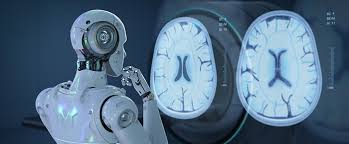AI in Disease Diagnosis
Science & Technology SciencePosted by NewAdmin on 2025-02-27 08:56:37 |
Share: Facebook | Twitter | Whatsapp | Linkedin Visits: 16

Artificial Intelligence (AI) is revolutionizing medical diagnostics by enhancing speed, accuracy, and efficiency in detecting diseases. Traditional diagnostic methods rely heavily on human expertise, but AI-driven models are proving to be more reliable and scalable. In medical imaging, AI has transformed radiology by analyzing X-rays, MRIs, and CT scans with remarkable precision, improving the detection of diseases such as lung cancer and breast cancer at early stages. Additionally, AI is enabling early disease detection by analyzing vast amounts of patient data, helping predict conditions like Type 2 diabetes and Alzheimer’s before symptoms appear.
AI is also making significant advancements in pathology and blood testing. AI-powered microscopes assist pathologists in identifying cancerous cells with high accuracy, while liquid biopsy technologies, such as those developed by Grail, use AI to detect cancer through a simple blood test. In the field of infectious diseases, AI played a crucial role in COVID-19 diagnosis and continues to help in detecting conditions like tuberculosis and malaria, especially in remote areas. Wearable devices equipped with AI algorithms are further improving remote health monitoring, allowing smartwatches to detect heart disease risks and AI-based sensors to help diabetic patients manage blood sugar levels in real time.
Moreover, AI is transforming personalized medicine by analyzing genetic data to recommend tailored treatments. It assists in cancer treatment planning and pharmacogenomics, ensuring medications are suited to individual patients. In mental health, AI-powered chatbots analyze speech and text patterns to detect depression and anxiety, while eye-tracking technology helps in diagnosing autism spectrum disorders in children. Looking ahead, AI’s potential in diagnostics is expanding into fields such as robotic surgeries, genomics for rare genetic disorder detection, and AI-powered nanotechnology for early cancer detection at the cellular level. With ongoing research and advancements, AI is set to redefine the future of healthcare, making disease diagnosis faster, more accurate, and accessible worldwide.
Search
Categories
Recent News
- Hyderabad Firm's $700K Foreign Exchange Fraud Unveiled
- Indian-Israeli Alliance: Unlocking AI's Edge Potential
- T20 World Cup 2026: Pakistan Refuses to Face India in High-Stakes Match
- Massive Development Push in Nellore Rural: 240 Projects, One Goal
- Unveiling the Truth: Maxwell Emails Validate Prince Andrew's Scandalous Photo
- Royal Courage: Kate Middleton's Cancer Battle and Message of Hope
- Solar Power Shines on Temple Lands
- Suryakumar's Resurgence: A Masterclass in Adaptability
Popular News
- Navigating IPO Market Dynamics Amid Volatility and Regulatory Changes
- Massive Worldwide Microsoft Outage Disrupts Multiple Sectors
- Panjapur Bus Stand to Reshape TNSTC Routes
- తెలుగుదేశం పార్టీ - పేదరికాన్ని నిర్మూలించడంలో వాగ్దానం
- Universities Embrace Remote Learning Technologies Amidst Ongoing Pandemic